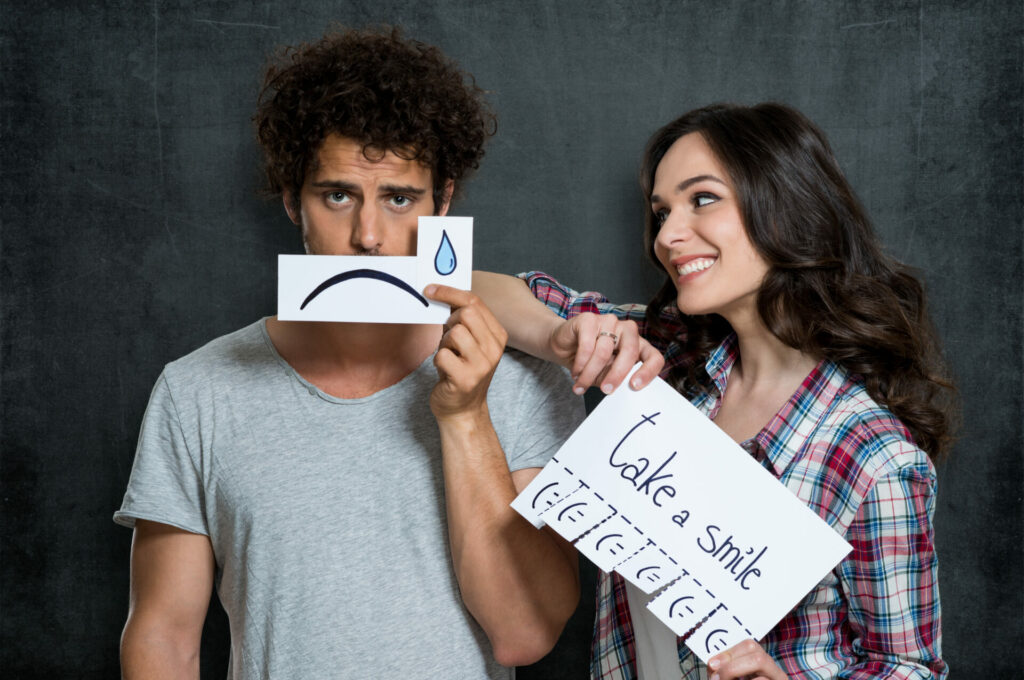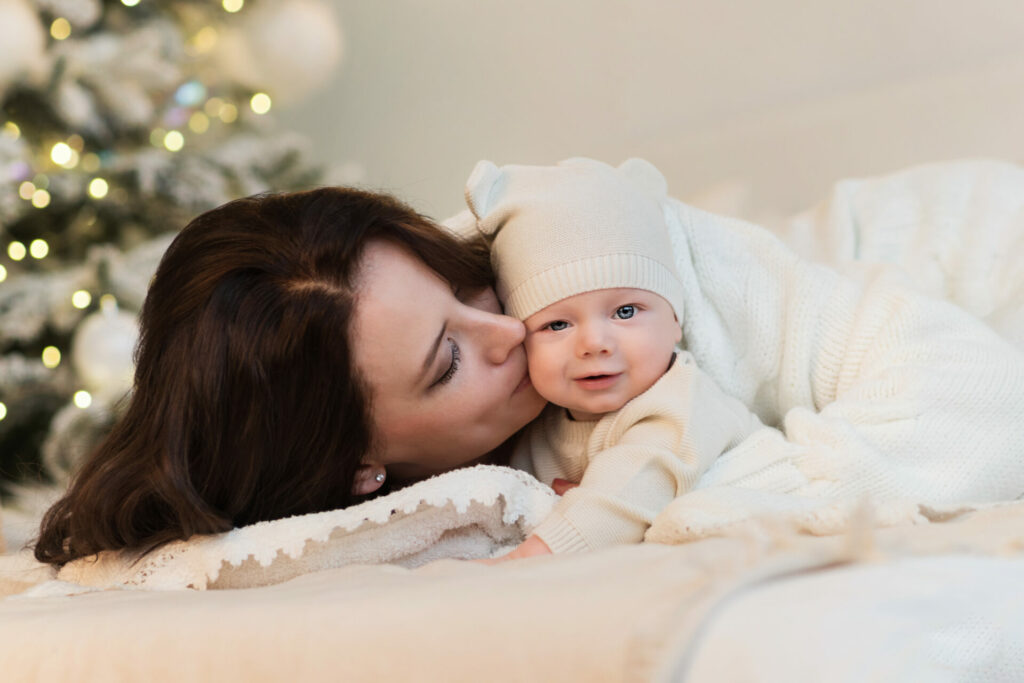Kat is an optimist. She loves nothing more than living her life to its fullest, travelling to different countries, shopping on impulse, trying new restaurants and taking up sports she’s often never even heard of before.
In her everyday life, if she’s ill, she knows she’ll get better. If she loses a job, she tells herself she’ll find another one. And when she makes a mistake, she laughs it off and learns her lesson.
The trouble is, Kat’s husband Ed doesn’t think that way. Quick to point out the dangers, Ed tells her the holiday destination she’s picked might be in danger of floods or they could catch Covid on the plane; the restaurant she’s booked had a poor review and they’ll get food poisoning; the sport she chooses is risky and Kat would hate to be out of action with an injury.
‘I bounce into the apartment, all excited about the things I want us to do as a couple, and it’s as if one by one, Ed shoots my ideas down,’ says Kat, 33. ‘Surely everything has a risk but we wouldn’t do anything at all if we lived our lives like that. I just wish Ed would live a bit.
Don’t Bring Me Down
‘It’s amazing we’re compatible when we think so differently. I see good things in most things and people, while Ed is just the opposite. If he can forecast doom and gloom, he will.’
According to experts, Kat and Ed aren’t rare. Most of us fall into the glass half full camp, or the glass half empty brigade. And it’s no surprise that we often settle down with our polar opposite – the optimist in Kat sought out the pessimist in Ed, and vice versa, for a reason.


Tanya Sibley, a certified hypnotherapist practitioner and founder of Rapid Mind Therapy, based in Abu Dhabi, says the old adage that opposites attract is so true, and she goes as far as to suggest that we search for our opposite.
Most of us fall into the glass half full camp, or the glass half empty brigade. And it’s no surprise that we often settle down with our polar opposite
‘We subconsciously look for someone who has different qualities and strengths that we perhaps would like in ourselves,’ says Tanya, who’s a member of the International Association of Therapists. ‘We see this through Disney films where Ariel falls in love with a human prince and Belle falls for a beast.
Opposites Attract
‘Opposites who attract will fall in love or become attracted to each other faster, mainly because they are learning new things every day. They have an innate inquisitiveness about a person who may have different skills and views on life. It’s like an adventure.
‘We’re all brought up on different paths and with different beliefs which allows us to bring a new flavour to the relationship or partnership.,’ she says. ‘The world is now so vast compared to hundreds of years ago. Thanks to transport, we can connect with different cultures and experience new and different things, which we can, in turn, apply to our relationships.’
And when we pair with an opposite, we create a team with balance – one of us can be yin to the other’s yang. One will see life through rose-tinted spectacles while the other is hypervigilant, aware of dangers lurking ahead. One may steam ahead, while the other holds back.
What makes relationships work isn’t similarities – it’s complementarity. If a person is extroverted, they are better suited to an introvert. We’re all looking for characteristics we lack, hence the attraction of optimists and pessimists
Tanya explains: ‘Each person plays a different role in a relationship. We admire our partners for their skills – often ones we don’t have. Someone who is very tidy may be admired by their partner who’s quite messy. If two people were to share the same roles in a relationship, it could easily cause competition, friction and resentment.’
The idea of opposites attracting was first mentioned in psychology by Robert Francis Winch, who studied spouses in the 1950s. Winch concluded it wasn’t similarities that made a relationship work; it was complementarity. For example, if a person is extroverted, they are better suited to an introvert and vice versa. The theory is that we’re all ultimately searching for characteristics we lack, hence the attraction of optimists and pessimists.

‘You often hear that among parents, one is good cop and the other is bad cop,’ adds Tanya. ‘One partner may remain calm in certain situations, like missing a train or a flight being delayed, while the other would show signs of anger or frustration. Seeing someone who is calm and collected would instantly help the angry one to simmer down.’
So should we adapt so we can live in harmony with our partners? Does the optimist accept her husband will always rein her in, while the pessimist will just shake his head in dismay at what he sees as his wife’s wild streak? Tanya believes it’s about weighing up both viewpoints.
‘There’s no right or wrong way,’ she says. ‘We often find common ground, when things are less important to us.’
But when does this become a problem? Do we get to a situation when our optimistic husband tries our patience with all his precarious business deals, or do we get fed up of our pessimistic wife not wanting to take a risk on last-minute flights?
Optimist Vs Pessimist
Phil Olley, a motivational coach and speaker, says firstly we must be careful about labels. ‘Optimism and pessimism are a state of mind in any given moment,’ says Phil, author of Reflections from the White Tunnel (FCM Publishing). ‘If someone’s unhappy because they have financial difficulties, they’re not necessarily a pessimist. They’re just on a downer.
‘The difficulty comes when these differences create frustration between a couple. If the optimist feels they’re not moving forward quickly enough in their relationship, and the pessimist says they can’t get married because one of them might lose their job, resentment can start to build up.
‘A battleground can develop. The pessimist might say they listened to the optimist last time and the holiday was a disaster or they lost all their savings on a business venture. They might start to blame the other for mishaps.’

Tanya adds: ‘If one person is carrying around trauma from their early years, this could put a divide between them. The differences, when extreme, could drive a wedge between you.
‘But again, it all boils down to working in a team, finding time for each other, making room for each other’s traits, understand why they are behaving the way they are, whether that’s due to cultural differences, different work ethic, family, and life values.’
So how can we ensure we live in harmony, whether our glass is half full or half empty? Here are 5 ways:
Feel You’re Enough
Tanya says we all struggle with not feeling good enough, and when we feel that way, we lose confidence in ourselves, we self-sabotage, we don’t let people in and we fail to achieve goals because we fear they will end in rejection.
‘Take a look at Rapid Transformational Therapy – there are online courses that will instantly eradicate the belief of not feeling enough,’ she advises. ‘Once you find yourself within, and gain back that confidence you were born with, you will instantly see your life unfolding in ways you never thought possible.’
Have Shared Goals
Sit down and get really clear about what you both want in life, suggests Phil.
‘If you both want to go on a cruise, for example, the optimist will want to book it immediately. The pessimist will worry about getting seasick or falling overboard.
‘But if it’s something they really want to do, the optimist can help the pessimist conquer their fears. They can support each other through the process and achieve a goal together.’
Be Sensitive
Pessimism is often seen as negative, but it can be a positive trait, Phil reminds us.
‘The pessimist will often sit down and think a dilemma through. They’ll mull over whether something is such a good idea,’ he says. ‘They often put the brakes on hare-brained schemes, and looking back, a couple will see the pessimist made the right call.
‘Sometimes an optimist will goad the pessimist. If the pessimist is fearful about flying, for example, and the optimist is keen to go away on holiday, the optimist will keep going on and on about how safe flying is. This constant niggling doesn’t help – and makes the pessimist feel even worse.’
Communicate!
Without communication, nothing will be resolved, says Tanya.
‘It allows you to speak and to acknowledge your partner’s views,’ she says. ‘Seeing a marriage therapist is a good way of allowing both partners to communicate in an open and safe environment.
‘In therapy you will learn new skills on how to deal with conflict, how to identify the positive qualities in each other and how to renew the connection that we all need to survive.’
Reach Common Ground
If you are struggling with your partner’s optimism or pessimism, make an effort to spend some quality time together.
‘Take an interest in each other’s passion and make it fun,’ advises Tanya. ‘Sometimes our days are so manic that we forget to make time for each other, so try alphabet dating. Start with the first letter of the alphabet and do something fun that starts with A. Don’t stop until you get to Z.
This is exciting and it allows you to feel connected with each other again. It also initiates new conversations. It doesn’t have to be about spending money: you can take a picnic to the beach or the park, watch a movie together or go for a run or walk together.’









